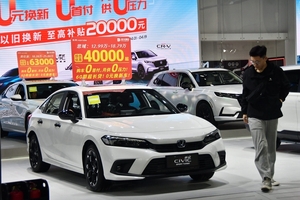China’s Car Trade-In Policy Falls Short of Expectations, Observers Say
Listen to the full version

A national vehicle trade-in policy aimed at boosting consumption in China has fallen short of expectations, an industry source told Caixin, as households remained reluctant to spend amid an uneven economic recovery and repeated rounds of price cuts.
Since the Ministry of Commerce began to receive applications in March, it has received about 113,000 trade-in requests, a ministry official said at a Tuesday press conference.

Unlock exclusive discounts with a Caixin group subscription — ideal for teams and organizations.
Subscribe to both Caixin Global and The Wall Street Journal — for the price of one.
- DIGEST HUB
- China's national vehicle trade-in policy aimed at boosting consumption has had limited success, receiving about 113,000 applications since March.
- The policy offers subsidies for purchasing new-energy and certain gasoline-powered vehicles, but economic uncertainty and price cuts have deterred spending.
- The trade-in policy is expected to increase auto sales by around 300,000 units by year-end, but high old-car ownership and low purchasing power limit its impact.
- Tesla Inc
- Tesla Inc. initiated a price war in China's auto market in late 2022 in an attempt to revive slowing demand. This price reduction strategy prompted Chinese rival BYD Co. Ltd. and other EV makers to also lower their prices. The China Passenger Car Association predicted in February that the price competition in the auto industry would remain intense this year.
- BYD Co. Ltd.
- BYD Co. Ltd. is a Chinese electric vehicle maker involved in the ongoing price war in China's auto market. This year, BYD has cut the cost of popular models, prompting other EV-makers to follow suit. The price cuts by BYD and others have contributed to a challenging market environment, with potential buyers adopting a "wait-and-see" attitude, further impacting the effectiveness of China's vehicle trade-in policy.
- February 2024:
- The China Passenger Car Association predicted that the auto industry price war would remain fierce in 2024.
- March 2024:
- The Ministry of Commerce began to receive applications for the national vehicle trade-in policy.
- March 2024:
- The State Council released an action plan to promote large-scale industry equipment renewals and trade-ins of consumer goods.
- April 2024:
- Seven government departments, including the commerce and finance ministries, laid out the details of the vehicle trade-in policy.
- May 2024:
- Retail sales of passenger cars dropped 1.9% year-on-year to 1.71 million units.
- MOST POPULAR






